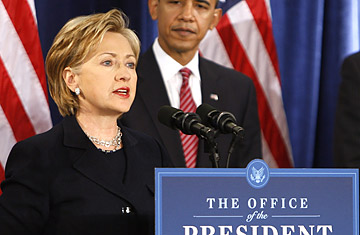
Now that Hillary Clinton has been nominated to be Secretary of State, President-elect Barack Obama's former Democratic rival will begin preparing for the job that awaits her in less than two months. During the transition, there are a few things that may give a sense of what to expect when she actually does take office after her likely confirmation by the Senate early next year: how well she coordinates with Defense Secretary Bob Gates and incoming National Security Adviser Jim Jones; which aides she chooses to help in the transition; what her role in current crises in South Asia and the Middle East may be; and which of her campaign-agenda items she indicates she will push within the Administration.
This week, Clinton is planning meetings with all the living former Secretaries of State, soliciting their views and advice on the job. She will also begin consultations with Obama, Gates and Jones on the primary foreign-policy choices facing the Administration: how fast to pivot from Iraq to Afghanistan; whether to launch a new diplomatic initiative to curtail Iran's pursuit of nuclear weapons; how to handle the suspended talks with North Korea when they resume next year; what approach to take on the multiple crises in South Asia; and when and how to reinvigorate the Middle East peace process.
Clinton is also expected this week to name her own agency review team to take over from the Obama transition team. Clinton's group will organize her briefings from State Department officials, coordinate on imminent decisions and oversee the handover of power from Condoleezza Rice. Whoever runs that review will be well positioned to assume top roles once Clinton takes over and will potentially indicate the ideological direction she may pursue at Foggy Bottom.
The current Obama State Department review is headed by Wendy Sherman, a former Clinton adviser. Sherman is a veteran of Madeleine Albright's State Department, and if Clinton retains her, it could signal a return at State to the approach Albright pursued — more activist than realist abroad (as reflected in Albright's approach to Kosovo and Bosnia), but nevertheless fairly centrist. If Sherman is not kept on, the range of potential replacements runs from cautious liberals to even some moderate Republicans. Whoever her top picks turn out to be, Clinton will probably bring with her several aides from the Senate: her personal aide, Huma Abedin; Andrew Shapiro, her foreign-policy staffer; and her longtime press aide, Philippe Reines.
A key player to watch in the transition is Richard Holbrooke, one of Clinton's closest foreign-policy advisers during the primaries and a potential top player in Obama's diplomacy now that Clinton is headed for State. Holbrooke is a career diplomat, known for being smart and effective but also hard to control and outspoken, qualities that haven't always endeared him to certain peers in the party. Having already served in high-level State Department positions in previous Democratic Administrations, he tends to dominate policy in his area of operations, as he did with respect to the negotiations over ending the Bosnian war in the 1990s. Holbrooke has been talked about for top troubleshooting jobs like special envoy to the Middle East or South Asia.
Clinton will also begin planning her travel schedule. Aides expect her to go abroad "very early in her tenure, to begin to reassure the international community about America." Her first destinations will most likely be allies in Europe, the Far East and the Middle East. She may also travel early to South Asia, where tensions between Pakistan and India are rising in the wake of the Mumbai terror attacks. "She does have a pre-existing relationship with [Pakistani Prime Minister Asif Ali] Zardari," says one foreign-policy aide, "and she has visited India multiple times and is quite popular there. The hope is she can use those relationships to engage in diplomacy to improve the situation."
One regional initiative Clinton is likely to pursue is installing a presidential envoy between Afghanistan and Pakistan to help improve security and cooperation in the largely ungoverned tribal areas along the two countries' border. Clinton pushed the initiative during the primaries, and at one point, her husband was considered for the job. Another top Clinton initiative during the primaries was a plan to fund expanded global education. But with the onset of the financial crisis, Obama's foreign-policy aides have said he is unlikely to deliver soon on his campaign promise to double U.S. foreign aid.
Clinton can expect an early grace period abroad, during which she will be welcomed as the representative of a new American Administration. After that, however, we will see just what kind of Secretary of State Hillary Clinton will be. "When the honeymoon period is over, you're still going to have to plug along every day, inch by inch, and you'll still have to make agreements that serve America's best interests," says a foreign-policy aide.
